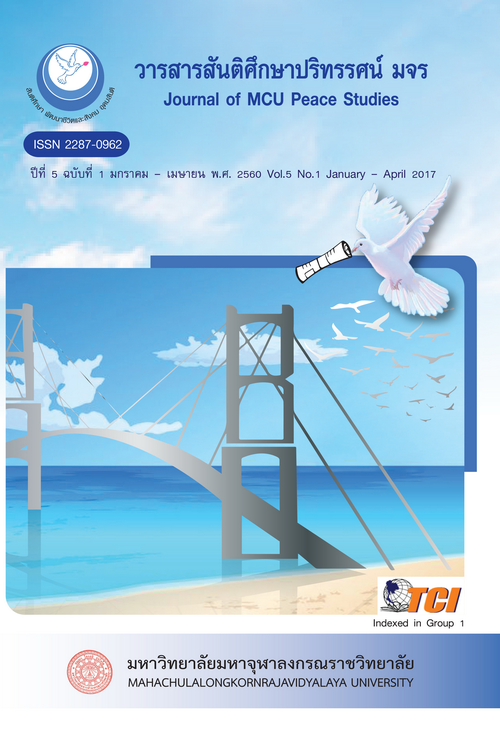The Development of a Counseling Model in an Integrative Buddhist Psychology of the Counseling Monks
Main Article Content
บทคัดย่อ
This study was a qualitative research in nature with the following objectives: (1) to study counseling approaches in Buddhist psychology and western psychology; (2) to study the Buddhist psychological counseling approach of counseling monks; and (3) to develop the counseling model in an Integrative Buddhist Psychology of counseling monks.The results of the counseling model in an Integrative Buddhist Psychology of counseling monks included 6 components, namely, (1) the goal of counseling (2) the Buddhadhamma relevant to counseling
(3) the crucial characteristics of counseling monks (4) the counseling process (5) the counseling skills and (6) the result of counseling. Moreover, it found that the counseling model in an integrative Buddhist psychology of the counseling monks was in the most highly appropriate assessment. The assessment after using this counseling model also found that the counselees reflected positive changes within themselves, i.e., being spiritually strong, not blaming others, being warm, comfortable and happier, seeing the ways out, and being determined to do good more and more.
(3) the crucial characteristics of counseling monks (4) the counseling process (5) the counseling skills and (6) the result of counseling. Moreover, it found that the counseling model in an integrative Buddhist psychology of the counseling monks was in the most highly appropriate assessment. The assessment after using this counseling model also found that the counselees reflected positive changes within themselves, i.e., being spiritually strong, not blaming others, being warm, comfortable and happier, seeing the ways out, and being determined to do good more and more.
Article Details
รูปแบบการอ้างอิง
Thitichotrattana, W., Srikhruedong, S., & Krisanarungsun, E.- on. (2016). The Development of a Counseling Model in an Integrative Buddhist Psychology of the Counseling Monks. วารสารสันติศึกษาปริทรรศน์ มจร, 5(1), 103–115. สืบค้น จาก https://so03.tci-thaijo.org/index.php/journal-peace/article/view/79278
ประเภทบทความ
บทความวิจัย
ทัศนะและความคิดเห็นที่ปรากฏในบทความในวารสาร ถือเป็นความรับผิดชอบของผู้เขียนบทความนั้น และไม่ถือเป็นทัศนะและความรับผิดชอบของกองบรรณาธิการ ยินยอมว่าบทความเป็นลิขสิทธิ์ของวารสาร


